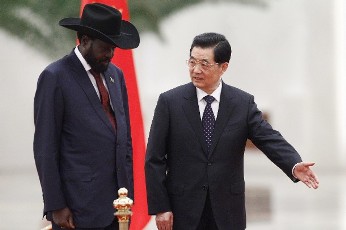South Sudan president in China seeking diplomatic support in conflict with Khartoum
April 24, 2012 (KHARTOUM) – The president of South Sudan Salva Kiir pleaded the case of his country with China saying that Khartoum has declared war on Juba as he started a five day visit to Beijing.

“I have undertaken this visit because of the great relationship that I value with China. China is one of our economic and strategic partners,” Kiir added.
Last Friday, the Sudanese army managed to recapture the oil-rich region of Heglig after South Sudan occupied it for 10 days sparking the worst military conflict between the two sides since the country split into north and south in July 2011.
On Monday witnesses and officials in South Sudan said that Khartoum air force carried out bombing raids in Unity States that fell on a market in Bentiu.
The escalation comes as a reflection of failure of Khartoum and Juba to settle through negotiations a number of key post-independence items and particularly the issue of how much landlocked South Sudan should pay to transport its oil through the north’s pipelines.
China has been the largest single importer of oil from Sudan prior to the South Sudan’s breakaway last year. The latter took 75% of the country’s oil when it seceded.
But earlier this year South Sudan suspended its oil production after Sudan started taking part of the oil as payment in kind to make up for what it called unpaid fees.
Last February, Juba ordered Liu Yingcai, the head of the Chinese-Malaysian oil consortium Petrodar, out of the country and accused him of not honoring the terms of reference of the memorandum of understanding which they signed in December.
The latest Chinese customs data show crude imports from Sudan fell nearly 40 percent in January and February compared to a year earlier.
China made a failed attempt last December to mediate between the two countries on the oil issue. Following that Beijing remained largely silent while calling on Khartoum and Juba to continue dialogue.
But last week, Sudan’s President Omer Hassan al-Bashir threatened to crush the “insect” government of the South, and said the time for talks was over.
The Chinese president appeared careful not to take sides on the Khartoum-Juba row and urged continuation of dialogue.
“The urgent task is to actively cooperate with the mediation efforts of the international community and halt armed conflict in the border areas,” Hu was quoted as telling Kiir during a meeting in Beijing.
“China sincerely hopes that South Sudan and Sudan can become good neighbors who coexist in amity and good partners who develop together,” Hu added.
Kiir and Hu witnessed the signing of several agreements between the two countries that cover humanitarian aid, solar energy and financial cooperation.
Gum Bol Noah, an official from Kiir’s office, said the China National Petroleum Corporation (CNPC) was willing to offer South Sudan technical support if Juba decided to build an alternative oil pipeline, making it less reliant on the pipeline running through Sudan.
Information Minister Barnaba Marial Benjamin confirmed to Dow Jones China’s interest in financing the project.
“The Chinese are already there and we will continue with them, no problem” Benjamin said.
“Everybody will apply and we will see who has the capacity and who can generate a good consortium of companies to create money” he added.
Kiir attended the opening ceremony of the South Sudanese embassy in Beijing yesterday and will meet Vice-Premier Li Keqiang today.
(ST)

